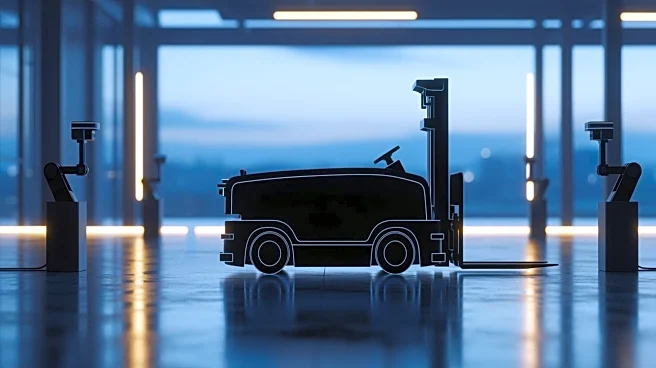What's Happening?
Outrider, a leader in autonomous yard operations, has introduced the first enterprise-class support services aimed at enhancing the performance and uptime of driverless yard operations. These services are set to support the commercial rollout of Outrider's driverless system in 2026, targeting Fortune 500 companies to maximize their return on investment in automation. The autonomous yard operations market, valued at $64 billion globally, is projected to grow significantly, driven by large enterprises seeking to reduce costs, increase efficiency, and improve safety. Outrider's support services integrate self-reliant autonomous capabilities with technical support, facilitating the adoption of this technology. The system includes features like locating
misplaced trailers and notifying personnel for human assistance when needed. It also offers self-diagnostic capabilities to monitor the health of autonomous electric vehicles, ensuring efficient operations.
Why It's Important?
The introduction of enterprise-class support services by Outrider marks a significant advancement in logistics automation, particularly for large enterprises. By enhancing the efficiency and safety of yard operations, these services can lead to substantial cost savings and operational improvements. The growth of the autonomous yard operations market reflects a broader trend towards automation in logistics, which can transform how goods are managed and transported. This development is crucial for industries such as package shipping, e-commerce, retail, and manufacturing, which rely heavily on efficient logistics networks. The ability to automate repetitive tasks while providing technical support for complex scenarios can improve productivity and extend the lifespan of equipment, offering a competitive edge to companies that adopt these technologies.
What's Next?
As Outrider prepares for the commercial rollout of its driverless system in 2026, the company is likely to focus on expanding its customer base among Fortune 500 enterprises. The ongoing development and enhancement of AI-enabled systems will be crucial in addressing complex scenarios autonomously, further improving the efficiency of yard operations. Stakeholders in logistics and related industries may need to adapt to these technological advancements, potentially reshaping workforce dynamics and operational strategies. The success of Outrider's support services could encourage other companies to invest in similar technologies, accelerating the shift towards automated logistics solutions.
Beyond the Headlines
The launch of Outrider's support services highlights the growing importance of integrating AI and automation in logistics operations. This shift not only improves efficiency but also raises questions about the future of human roles in logistics. As robots take on more repetitive tasks, human workers may need to focus on problem-solving and managing edge cases. The ethical implications of automation, such as job displacement and the need for retraining, are important considerations for companies and policymakers. Additionally, the environmental impact of using electric autonomous vehicles could contribute to sustainability efforts in logistics, aligning with broader goals of reducing carbon footprints.















